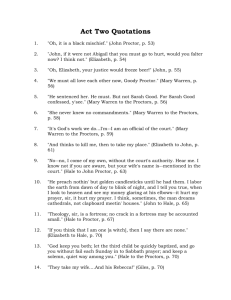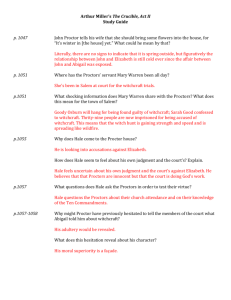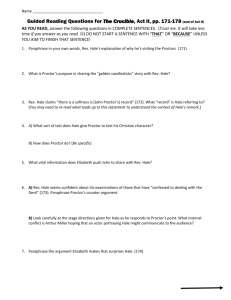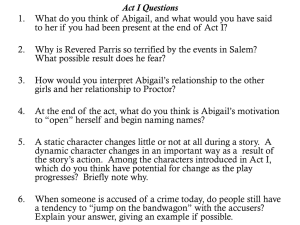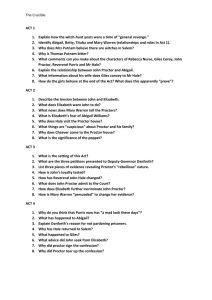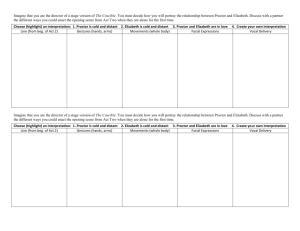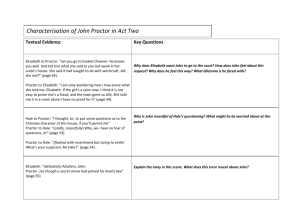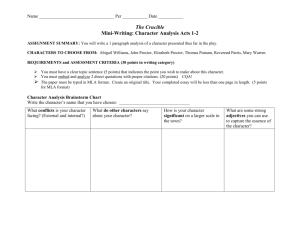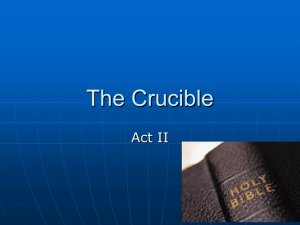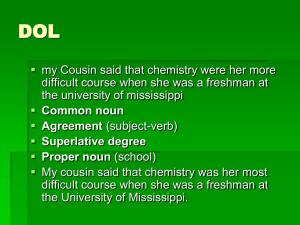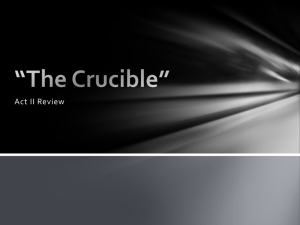AtHEThe crucible * Act 2
advertisement
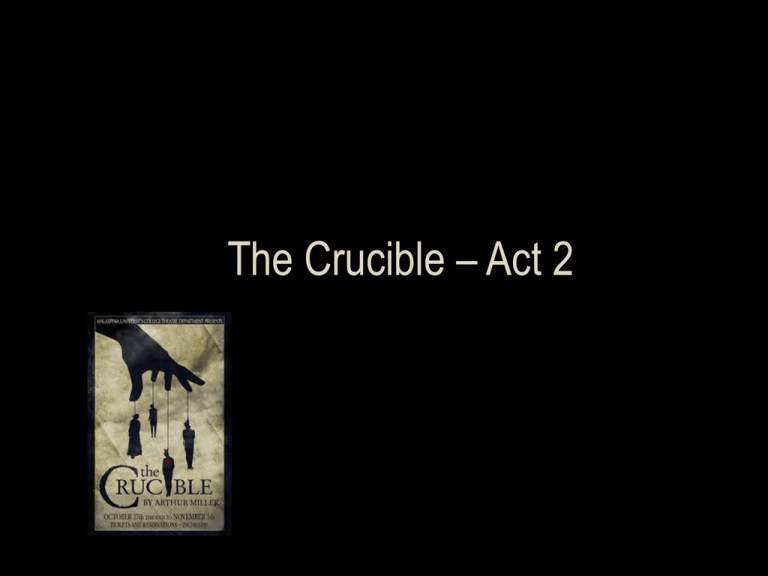
AtHEThe Crucible – Act 2 Literary devices Proctors stage directions [he has been reached by Hale’s words] this shows Proctors character who we had previously seen a strong out-going character, being defeated. He is clearly affected by the arrest of his wife, this stage direction shows that although in the beginning of act 2 they had some problems, they still care for each other deeply. It is evident that his character has also weakened from [hesitating, with deep hatred for himself].Towards the end of act 2 we see Proctors character reform from his soft side displayed from the stage direction [he throws her to the floor] which not only shows his mental strength, but also physical strength. Portraying him to be a powerful and dominant character. Lexical choice – possessive personal pronoun ‘My wife’ shows he has clear control over his wife. personal pronoun ‘we built the church’ included to reinforce solidarity and show Proctor is apart of the church, to prove his innocence. Hale: ‘You will agree, sir?’ Leading question including positive politeness to reinforce solidarity between characters, suggesting they all hold the same view. This also shows Hale to be forceful and affirm his status. Linguistic devices Hale agenda sets in this scene to assert his authority after it has been weakened by Proctor. Hale: ‘do you know your commandments Elizabeth’ shows Hale taking control which may reflect his position and higher status. This is also reflected through his use of Declaratives ‘Believe me, I know it’ Interrogatives are often used frequently throughout, but for different purposes. Hale leads to the conversation and gains information ‘why? What meanin’ has it?’, whilst Proctor uses them to agenda set and hold dominance ‘that is your popper is it not?’ Repetition- Hale: ‘No, no I have no-’ this shows Hales character breaking down and the repletion shows his view is weakening after being questioned by Proctor. The noun ‘proof’ is also repeated, not only to show desperation of the characters but it allows each character to emphasis their point ‘on what proof?’ ‘what proof?’ This shows urgency in Proctors character to save his wife. This leads the audience to question whether Hale actually has proof to arrest Elizabeth and realise the trials are for individual benefits. Whilst a audience today a accusation would not be a substantial amount, in this time period it would have. There are very few interruptions in the scene, showing that everybody is eager to hear the vital news showing nobody holds a clear dominance in the conversation. Dramatic effects. the inclusion of the poppet foreshadows for the audience that this item would back into the play again, due to the amount of emphasis placed on it and the problems that it has caused. Tension has slowly been building up to this point – the reader has a subtle hint that there could be problems for Elizabeth due to jealousy that Abigail holds and her status within society meant she could lead this to happen. This section in the play helps to reveal further the plot. As accusation have been made and the seriousness of the situation has raised as well respected characters have been arrested like Elizabeth and Rebecca Nurse. Reactions of the characters can been seen to represent Miller’s voice Francis – [with a mocking, half-hearted laugh] Elizabeth – ‘they’ve surely gone wild now’ both show that it is not taken seriously, and should be stopped. Rhetorical devices Personification- Proctor: ‘still an everlasting funeral marches around your heart’ Metaphor- Elizabeth: ’the magistrate sits in your heart that judges you’ ‘my wife is the very brick and mortar of the church’ – she is an important member of the community and shouldn’t be arrested (further trying to prove her innocence) The use of figurative language can be used to higher either Proctor or Elizabeth’s status. Typically it is used by women to reveal their feelings without being to harsh to protect pride, and also to reflect their sympathetic and empathetic nature. Context, themes and ideas. Proctor. “it is strange for a Christian girl to hang old women!” this quote shows Proctor as being like the moral compass and realistic character. Miller may have chosen to include this because he see’s himself like the realistic character, as he was also facing problems with the communist ‘red scare’. It could be interpreted that Miller didn’t agree with it, which is why he may have included the controversial character to show that not everyone took the same stance in Salem, as he didn’t either in America. Nobody knew what the poppet signifies previously, suggesting that it was harmless and the community has amplified it into something bigger. This could be seen evident in Miller’s era as actions considered a human right like privacy were no longer seen as innocent and had been built up to relate to the controversy of communism. The theme of religion runs throughout, using the lexical field of religion: (God, Devil, Bible, Heaven, Hell) used to suggest that in times of trouble, the community heavily rely on the Bible to either prove themselves or explain their actions.
